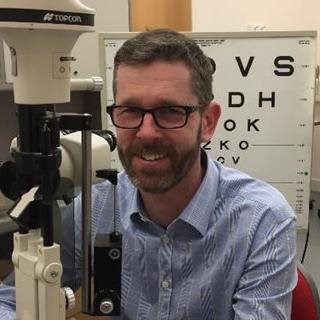Andrew Miller MCOptom Higher Cert LV

Andrew Miller MCOptom Higher Cert LV

My role
"My current job role is as the full-time lead on the Low Vision Team for a sight loss charity. I co-ordinate and manage the service which supports people with sight loss to make the best use of their residual vision.
My week is varied, about four days are spent in clinic and the rest of the time is managing the service, education and training, as well as working with partner organisations."
My responsibilities
“I work as part of a team to provide a holistic range of support to people who are visually impaired. This may include giving advice on magnification, lighting and contrast. But equally it could mean arranging support for welfare or emotional problems associated with sight loss.
The charity I work for offers teaching and training opportunities to other professionals, helping them to provide better support for people living with sight loss. As part of this work I teach sessions about low vision management at two different universities and in addition undergraduates from the local Optometry degree course spend half a day at our centre during their final year.
As part of my current role I have also been lucky enough to work abroad. I was initially teaching on the Vision Rehabilitation Masters course in Amman, Jordan, and then helping to develop low vision teaching curriculum and clinic services in Jordan and the West Bank. I have also just returned from a trip to Nepal and Bangladesh where I went to review low vision services in two hospitals.
Seeing services in lower resourced countries has helped me gain a new perspective on my role in the UK."
Career progression
"I did my pre-reg. three days per week in independent practice and two days per week in a hospital, which for me was a really good mix of clinical experience.
I worked in a range of high street and independent practices after that and spent 11 years at a large community multiple.
I worked part-time whilst I studied for my Masters and have been at my current post for the last 10 years."
Changes in the profession
"An ageing population coupled with new treatments means that there will be an increasing number of people needing good quality low vision support.
I think optometrists need more education and training around social care. Many optometrists will see patients where they may need to refer them to other agencies or be aware of what other partner organisations can offer.”
What I enjoy
"There are not that many optometrists working in the charity sector and therefore not so many opportunities, but I would say that there are niches to fill. I'd say to others interested in this part of the profession that it’s important to look for opportunities that interest you. I didn’t move away from optometry, but developed my skills which helped me find a new opening.
What I enjoy most about my job is that it’s so varied. Helping people to see better is what I got into the profession to do and working in a low vision service allows me to do just that.”
My role
"My current job role is as the full-time lead on the Low Vision Team for a sight loss charity. I co-ordinate and manage the service which supports people with sight loss to make the best use of their residual vision.
My week is varied, about four days are spent in clinic and the rest of the time is managing the service, education and training, as well as working with partner organisations."
My responsibilities
“I work as part of a team to provide a holistic range of support to people who are visually impaired. This may include giving advice on magnification, lighting and contrast. But equally it could mean arranging support for welfare or emotional problems associated with sight loss.
The charity I work for offers teaching and training opportunities to other professionals, helping them to provide better support for people living with sight loss. As part of this work I teach sessions about low vision management at two different universities and in addition undergraduates from the local Optometry degree course spend half a day at our centre during their final year.
As part of my current role I have also been lucky enough to work abroad. I was initially teaching on the Vision Rehabilitation Masters course in Amman, Jordan, and then helping to develop low vision teaching curriculum and clinic services in Jordan and the West Bank. I have also just returned from a trip to Nepal and Bangladesh where I went to review low vision services in two hospitals.
Seeing services in lower resourced countries has helped me gain a new perspective on my role in the UK."
Career progression
"I did my pre-reg. three days per week in independent practice and two days per week in a hospital, which for me was a really good mix of clinical experience.
I worked in a range of high street and independent practices after that and spent 11 years at a large community multiple.
I worked part-time whilst I studied for my Masters and have been at my current post for the last 10 years."
Changes in the profession
"An ageing population coupled with new treatments means that there will be an increasing number of people needing good quality low vision support.
I think optometrists need more education and training around social care. Many optometrists will see patients where they may need to refer them to other agencies or be aware of what other partner organisations can offer.”
What I enjoy
"There are not that many optometrists working in the charity sector and therefore not so many opportunities, but I would say that there are niches to fill. I'd say to others interested in this part of the profession that it’s important to look for opportunities that interest you. I didn’t move away from optometry, but developed my skills which helped me find a new opening.
What I enjoy most about my job is that it’s so varied. Helping people to see better is what I got into the profession to do and working in a low vision service allows me to do just that.”
Jasmin Patel MCOptom

Jasmin Patel MCOptom

My role
“My role is to raise awareness about brain tumours both within the optical community and among the public; the signs, symptoms and consequences of brain tumours and what we can be doing to help patients. I work in the Healthcare Engagement team of five people, with three nurses and a Programme Officer, for a medium sized company with approximately 100 staff. I am the sole qualified optometrist; however I work in a wider team that works on the optical project.
My job involves conducting research which enables me to create learning materials, CET lectures and articles. I give lectures at Local Optical Committees (LOCs) around the country and represent the charity at conferences.
As part of my role I contact practices to promote the HeadSmart campaign, for the early diagnosis of brain tumours in young people and to encourage opticians to display HeadSmart symptoms cards in their waiting areas.”
Career progression
“I did a Masters programme and spent my placement year split between a private practice and a hospital. I worked for a year in a community multiple and then locumed at a range of independents and multiples. I have continued to locum alongside other jobs.
I moved to a job role providing consultancy in clinical research. This involved travelling globally to consult on projects and teach staff various protocols, including refraction and contrast sensitivity.
I was interested in my current job in the third sector because it allowed me to explore optometry outside of the test room. I enjoy the strategic nature of the role, as well as maintaining patient interaction.”
Career opportunities
“The third sector is quite specialised and there are not as many job roles as in practice, however there are charities that focus on eye diseases and sight loss which have opportunities for optometrists.
You need to be driven and be able to think outside the box; the optical route is new in the charity, so I have had to be proactive in progressing optical engagement and awareness.
I have done the glaucoma and cataract LOCSU courses and am currently working towards MECS accreditation. Many independent and multiple practices are encouraging their optometrists to undertake the LOCSU courses. I think this is beneficial as it allows optometrists to recap their skills and knowledge.
I found my current job by searching online for professional service roles in optometry.”
Changes in the profession
“We are seeing optometrists becoming increasingly focused on eye health, for example with the introduction of MECS and more optometrist-led clinics in hospitals.
Managing patients within community practices reduces the strain on hospital services and improves the patient experience. This adds diversity to our roles."
My role
“My role is to raise awareness about brain tumours both within the optical community and among the public; the signs, symptoms and consequences of brain tumours and what we can be doing to help patients. I work in the Healthcare Engagement team of five people, with three nurses and a Programme Officer, for a medium sized company with approximately 100 staff. I am the sole qualified optometrist; however I work in a wider team that works on the optical project.
My job involves conducting research which enables me to create learning materials, CET lectures and articles. I give lectures at Local Optical Committees (LOCs) around the country and represent the charity at conferences.
As part of my role I contact practices to promote the HeadSmart campaign, for the early diagnosis of brain tumours in young people and to encourage opticians to display HeadSmart symptoms cards in their waiting areas.”
Career progression
“I did a Masters programme and spent my placement year split between a private practice and a hospital. I worked for a year in a community multiple and then locumed at a range of independents and multiples. I have continued to locum alongside other jobs.
I moved to a job role providing consultancy in clinical research. This involved travelling globally to consult on projects and teach staff various protocols, including refraction and contrast sensitivity.
I was interested in my current job in the third sector because it allowed me to explore optometry outside of the test room. I enjoy the strategic nature of the role, as well as maintaining patient interaction.”
Career opportunities
“The third sector is quite specialised and there are not as many job roles as in practice, however there are charities that focus on eye diseases and sight loss which have opportunities for optometrists.
You need to be driven and be able to think outside the box; the optical route is new in the charity, so I have had to be proactive in progressing optical engagement and awareness.
I have done the glaucoma and cataract LOCSU courses and am currently working towards MECS accreditation. Many independent and multiple practices are encouraging their optometrists to undertake the LOCSU courses. I think this is beneficial as it allows optometrists to recap their skills and knowledge.
I found my current job by searching online for professional service roles in optometry.”
Changes in the profession
“We are seeing optometrists becoming increasingly focused on eye health, for example with the introduction of MECS and more optometrist-led clinics in hospitals.
Managing patients within community practices reduces the strain on hospital services and improves the patient experience. This adds diversity to our roles."